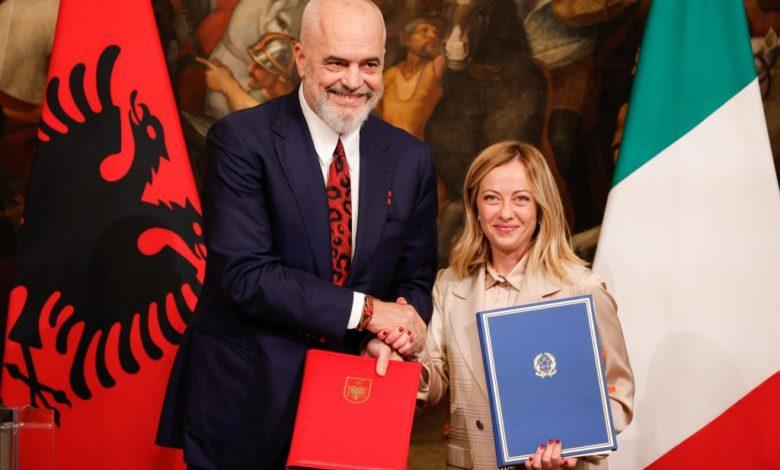
Italian representatives adopted a controversial agreement with Albania to send asylum seekers who survived drowning to closed centers in Tirana while their applications are considered, ignoring with their decision the criticism of non-governmental organizations, international institutions, and the opposition.
On Wednesday, February 14, representatives approved the project by a majority of 155 votes to 115 votes, with two representatives abstaining. It is expected to be easily approved by the Senate, where the hard-right ruling coalition led by Georgia Meloni enjoys a large parliamentary majority, according to the “InfoMigrants” website.
The agreement, signed by right-wing Italian Prime Minister Giorgia Meloni in November and her Albanian counterpart Edi Rama in Rome, stipulates that Italy will construct two buildings in this non-EU member country to accommodate migrants rescued in the Mediterranean Sea in order to “accelerate the processing of requests for asylum seekers or possible return to home countries.”
These two centers, run by Italy, will be ready to operate by spring 2024, to accommodate up to three thousand migrants, or about 39 thousand people annually. The two centers will not accommodate minors, pregnant women, or the most vulnerable people, according to Meloni.
The Albanian opposition filed an appeal before the Constitutional Court, considering that this agreement “violates the Albanian Constitution and abandons Albania’s territorial sovereignty,” which prompted the court to suspend the process of Parliament’s ratification of the migration agreement, waiting for it to issue a decision no later than March 6.
Even before its potential entry into force, this agreement sparked much criticism.
Opposition representatives in the Italian Parliament considered the agreement to be “election propaganda” ahead of the European elections scheduled for June, and that it was “useless, costly, inhumane and illegitimate.” They also criticized the estimated cost of its implementation at between 650 and 750 million euros over five years.
The International Rescue Committee IRC, a non-governmental organization, denounced the agreement, which it described as “dehumanizing.” IRC’s Europe Director, Imogen Sudbery, considered that “seeking asylum is one of the fundamental rights of any person, regardless of his or her origin or the way in which he or she arrived.”
About 158,000 people arrived in Italy in 2023, compared to 105,000 in 2022, according to the Italian Ministry of the Interior.
The United Nations High Commissioner for Refugees said in a statement in November that “mechanisms for transporting asylum seekers and refugees must respect international law related to refugees.”





